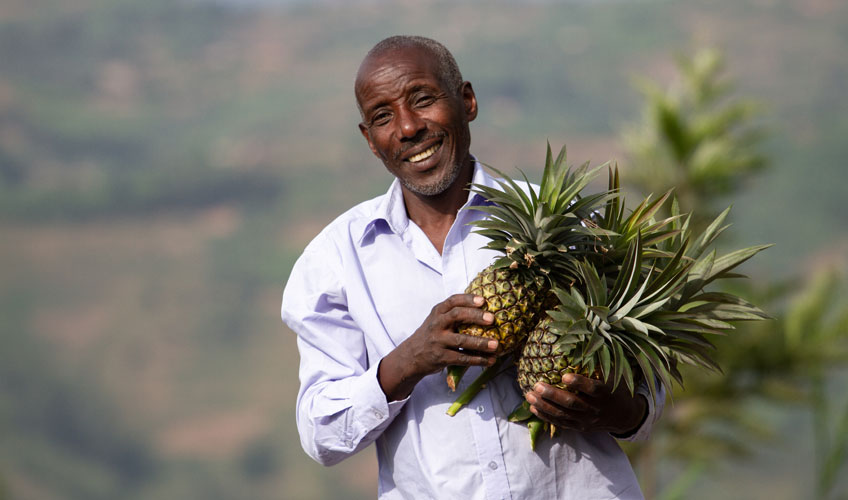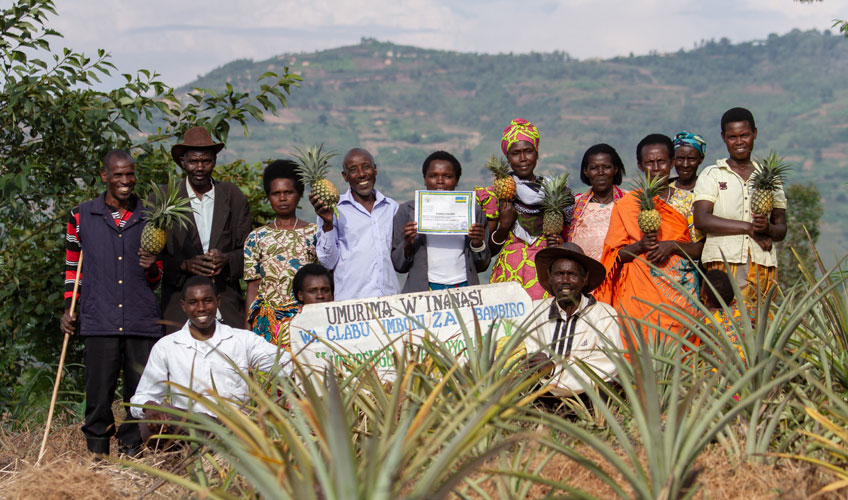“The pineapples that unite”: Alexis' story
Twenty-five years after Rwanda’s Genocide against the Tutsi, the country remembers the horrors of the past, but looks hopefully to the future.
“I think this country has a bright future,” says Alexis, an ex-prisoner.
Alexis is the president of the local “Pineapple Plantation”, an award-winning community initiative made up of around 30 people, including survivors, ex-perpetrators and younger people. Through joint finance schemes, such as planting pineapples, they bring the community together and improve lives locally.
The club, which now has a sustainable life of its own, was born out of International Alert’s extensive reconciliation work in the region, bringing together survivors, ex-prisoners, ex-combatants and young people. Alert’s approach revolved around dialogue clubs, trauma counselling and microfinance schemes, to help the community to identify common ground to live and work together, and learn how to resolve conflicts peacefully.

“The pineapple plantation is one of projects that we do as part of the club,” says Alexis. “Every Thursday, we meet, draw lots to select a member’s name. We then go and help that person. After that we sit together and share a meal.”
The club also operates a saving fund. “Every Thursday, we also put in some money into a saving fund, so that if somebody has got health issues, or other problems, we can support them,” Alexis explains. They also use the fund to help others in need of money, for example for a wedding or a funeral. “We make sure that everyone is happy in the club.”
“Dealing with shame and guilt”
The pineapple plantation is an example of how far Rwanda has come in the past 25 years.
Alexis had been a soldier with the notorious Interahamwe militia, during the 100-day genocide that in 1994 that claimed the lives of over 1 million people – mostly ethnic Tutsis and moderate Hutus.
“When I was on a killing rampage during the genocide I felt no remorse; I thought it was the right thing to do.”
My prayer is that in the future no one is deceived the way I was to hate Tutsis, to kill them. I did terrible things to innocent people. Why?
In the years that followed the genocide, he was accused of killing many families in his community, and he confessed to them. The local Gacaca court found him guilty of the crimes and he spent twelve years in prison.
He was released in 2006. “When I came out of the jail I already knew that I had committed a crime. So the first thing I did when I came out was to apologise. And those that I asked for forgiveness forgave me. I took a step [to get closer to them].”
The next step he took was to join an International Alert dialogue club in his village. “Before joining the club, even though I had sought forgiveness, I would still hide when I would see a survivor. I would hide behind the house, I was full of guilt and shame, despite having sought forgiveness. But this club helped me heal. I gave a survivor a cow, so that the children of that person could also have milk. The club helped deal with my sense of shame and guilt.”
“The club definitely changed me in many ways and helped me be a better person.”
“The pineapples unite us”

The pineapple plantation has been recognised for its contributions to reconciliation, winning awards at local and national levels. “Now we want to be number one at the national level,” Alexis tells us.
Their work has also inspired others within the community to show support:
A survivor who lives in [the nearby district of] Muhanga once came here and saw us eating pineapples- the fruit of our work – he offered to give us a piece of land. He said I want you to come and do the same thing there, because I believe this club is very unique in its work.
Alexis says support for the community group is crucial, because “these pineapples unite us.”
Twenty-five years on, Alexis advice to young people is to “Never do what we did. Nobody should ever do what we did. We did horrible things … When you look at the crime we committed, we did it without thinking or looking at the situation properly. I would advise young people to be conscious, not to follow everything blindly.”
“I really don’t think the horrors of the past will happen again. We are no longer ignorant like we were then.”
Explore more stories to see how our trauma counselling, dialogue clubs and microfinance have helped to rebuild lives.
About the project
The Duhuze project helps to consolidate peace and inclusion in Rwandan society by enhancing citizens’ participation in and ownership of reconciliation processes, policies and programmes. This includes enhancing psychosocial support for young people affected by transgenerational trauma and improving trust among marginalised groups through inclusive dialogue processes and joint economic initiatives.
It also aims to strengthen the capacities of authorities, civil society organisations and companies to effectively implement reconciliation and build peace.
The project is being carried out in 1,260 communities from 21 sectors across seven districts: Gasabo, Gisagara, Huye, Musanze, Ngororero, Nyamagabe and Rubavu.
Alert works on this project with the following local partners: Association des Jeunes pour la Promotion des Droits de l’Homme (AJPRODHO) and Rwandan Association of Trauma Counsellors (ARCT – Ruhuka).







